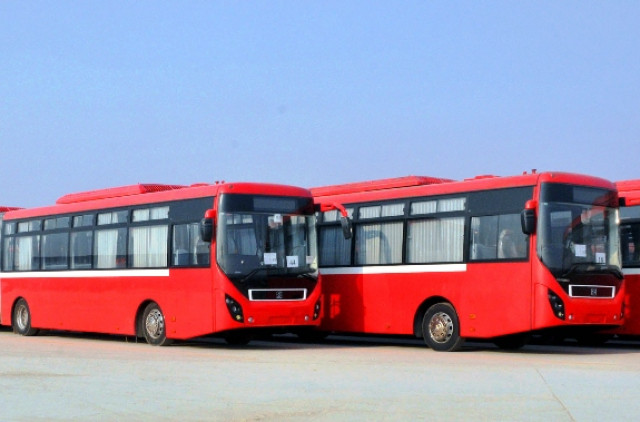At public hearing, environmental damage tops list of concerns
Officials insist dedicated corridor needed for speedy service.

NESPAK officials say environmental concerns had been flagged in the report and money and mitigation efforts had been mentioned.
Saturday’s public hearing on the Environmental Impact Assessment (EIA) report for the metro bus project’s Islamabad section failed to allay concerns that the capital’s green character would be protected or convince people that all possible steps had been taken to mitigate environmental and economic costs.
Despite severe criticism from environmentalists and residents on the cost, scope and road modifications for the project, officials stuck to their claim that the metro bus project would not violate the capital’s Master Plan.
As officials and residents argued at the hearing, the city’s environmental watchdog appeared to be only fulfilling formalities, creating doubts about the possibility of meaningful action against the project’s executors for apparent infringement on environmental laws.
During the hearing, organised by the Pakistan Environmental Protection Agency (Pak-EPA), civil society members said they supported a mass transit system for the city, but they were concerned about the way it was being executed. They pointed out risks to the capital’s natural environment, the lack of alternatives in the EIA report and alleged bias in impact assessment.
They also indicated that the public hearing should have been held before starting work on the project, which might have done irreversible damage. Construction began in Rawalpindi in March and on May 1 in Islamabad.
Officials from the project’s executing agency, the Rawalpindi Development Authority (RDA), Capital Development Authority (CDA), and the project’s consultant firm, NESPAK, denied irreversible environmental degradation. Instead, they claimed an elaborate environmental monitoring management plan with Rs178 million allocated for environmental protection.
The 13.6-km under-construction Islamabad section of the project is to be completed in eight months. According to the plan, 60 buses will ply on a dedicated corridor on Rawalpindi’s Murree Road and access 9th Avenue in Islamabad from IJP Principal Road near Faizabad. It is this dedicated road for the Metro Bus that is perhaps most controversial.
Fawad Anwar, an engineer, who attended the public hearing could not understand why the government needed a separate road when the 9th and Jinnah Avenues had enough lanes for a bus service. He said the trees could be saved if additional lanes were not inserted by destroying the green belts.
“The existing lanes should be used to run the bus,” agreed Imrana Tiwana, an architect from Lahore. “Better management and not a constantly expanding infrastructure will help avoid traffic congestion.”
NESPAK EIA team leader Kashif Bashir said the dedicated corridor is required because jaywalking and traffic congestion would prevent speedy bus service.
CDA Chairman Maroof Afzal said green belts along 9th Avenue stretched up to 600 feet on either side and CDA could uproot them to expand the avenue, as they were marked as “right of way” in the city’s plan. “I assure you there is no Master Plan violation.
While some residents, most of whom appeared to be PML-N supporters, said the trees could be sacrificed in the public interest, others contested, on grounds of conflict of interest, the legality of the EIA report, which has been prepared by NESPAK, the consultant firm for the metro bus project.
Dr Farrukh Chishtie, an environmental activist from Subh-e-Nau, said the EIA report was “not objective” and “too close to vested interests of the developers.”
Both RDA and NESPAK officials said environmental concerns had been flagged in the report and money and mitigation efforts had been mentioned.
The Punjab Environmental Protection Agency had approved a separate EIA report prepared by NESPAK in March and officials said they welcomed Pak-EPA’s scrutiny. But they could not deny that work had already started in Islamabad without Pak-EPA’s approval.
Pak-EPA has issued a notice to RDA for starting work on the Islamabad section without first getting a No Objection Certificate (NOC), said the agency’s Director-General Dr Muhammad Khurshid, who chaired the public hearing.
According to the Pakistan Environmental Protection Act 1997, RDA cannot start construction without EPA’s approval. Capt. (Retd) Zahid Saeed told The Express Tribune that construction in Islamabad was started without an NOC because the Islamabad section is behind schedule and the project’s strict timelines have to be met to finish it on time.
If RDA defies Pak-EPA’s notice, the agency can issue an Environmental Protection Order and RDA would have to appear before an environmental protection tribunal. Islamabad, however, does not have a functional tribunal, according to the law ministry, which means RDA might get away with a slap on the wrist.
Published in The Express Tribune, May 4th, 2014.



















COMMENTS
Comments are moderated and generally will be posted if they are on-topic and not abusive.
For more information, please see our Comments FAQ